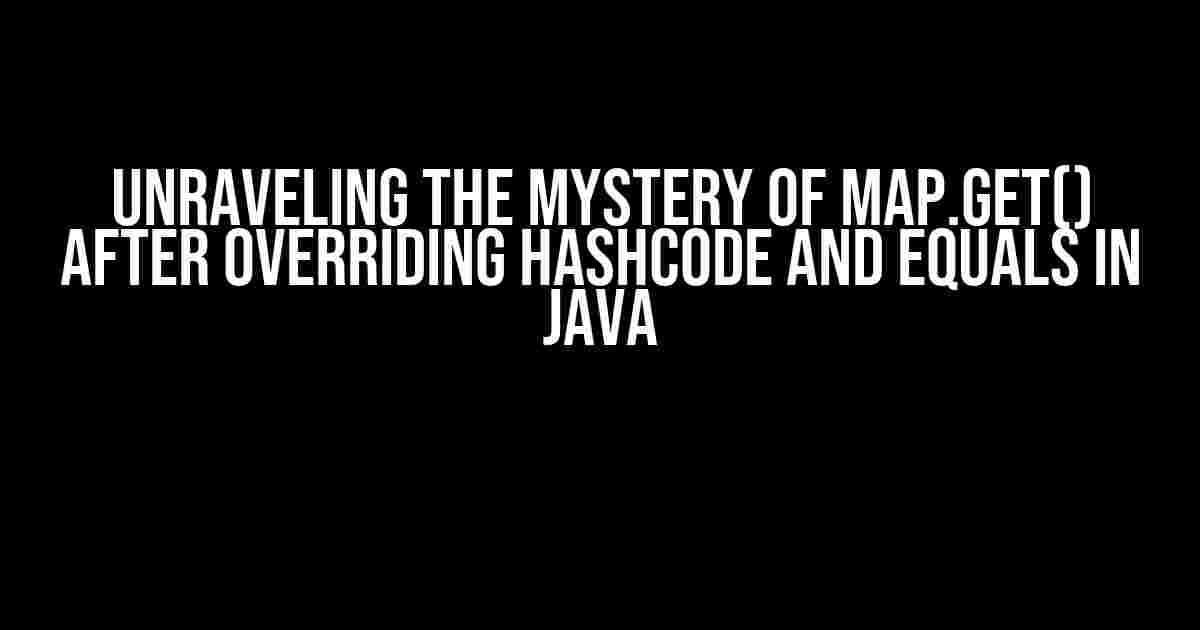Are you tired of scratching your head, trying to figure out why your Map.get() method isn’t working as expected after overriding hashCode and equals in Java? Well, buckle up, friend, because we’re about to dive into the nitty-gritty of how these three methods interact and how to make them play nice with each other.
Why Do We Need to Override hashCode and equals?
Before we dive into the specifics of Map.get(), let’s quickly cover why we need to override hashCode and equals in the first place. When you create a custom class in Java, you’re essentially creating a new object type. However, this new object type doesn’t magically inherit all the necessary methods to make it work seamlessly with various data structures like Maps.
To make your custom class work with Maps, you need to provide a way for Java to identify and differentiate between objects. This is where hashCode and equals come in. The hashCode method generates a unique integer value for each object, while the equals method checks whether two objects are equal.
Think of it like a real-life scenario. Imagine you’re trying to find a specific person in a crowded room. You can’t just yell out “Hey, is anyone here named John Smith?” and expect the right person to respond. You need a way to identify the person, like a unique identifier (hashCode) and a way to verify their identity (equals).
How hashCode and equals Affect Map.get()
public class Person {
private String name;
private int age;
@Override
public int hashCode() {
return Objects.hash(name, age);
}
@Override
public boolean equals(Object o) {
if (this == o) return true;
if (o == null || getClass() != o.getClass()) return false;
Person person = (Person) o;
return age == person.age && Objects.equals(name, person.name);
}
}
public class Main {
public static void main(String[] args) {
Map<Person, String> personMap = new HashMap<>();
Person person1 = new Person("John", 25);
Person person2 = new Person("John", 25);
personMap.put(person1, "Person 1 Value");
System.out.println(personMap.get(person2)); // Returns null?
}
}
The Reason Behind the Missing Value
Best Practices for Overriding hashCode and equals
- Consistency is key: Make sure that if two objects are equal according to the equals method, they also have the same hashCode.
- Use the same fields for hashCode and equals: Ensure that the fields used to generate the hashCode are the same as those used in the equals method.
- Avoid using mutable fields: If your class has mutable fields, avoid using them in the hashCode and equals methods. This can lead to inconsistent behavior.
- Follow the contract: Always follow the contract specified in the Java documentation for the hashCode and equals methods.
Putting it all Together
public class Person {
private final String name;
private final int age;
public Person(String name, int age) {
this.name = name;
this.age = age;
}
@Override
public int hashCode() {
return Objects.hash(name, age);
}
@Override
public boolean equals(Object o) {
if (this == o) return true;
if (o == null || getClass() != o.getClass()) return false;
Person person = (Person) o;
return age == person.age && Objects.equals(name, person.name);
}
}
public class Main {
public static void main(String[] args) {
Map<Person, String> personMap = new HashMap<>();
Person person1 = new Person("John", 25);
Person person2 = new Person("John", 25);
personMap.put(person1, "Person 1 Value");
System.out.println(personMap.get(person2)); // Returns "Person 1 Value"
}
}
Conclusion
Frequently Asked Question
Are you lost in the world of hashcodes and equals methods in Java? Don’t worry, we’ve got you covered! Here are some FAQs to help you navigate the map.get() method after overriding hashCode and equals methods.
Why do I need to override hashCode and equals methods when using a HashMap in Java?
When you override the equals method, you’re telling Java how to determine equality between objects. However, the hashCode method is used to generate a unique integer identifier for each object. If you don’t override both methods, Java will use the default implementations, which can lead to unexpected behavior when using a HashMap. By overriding both methods, you ensure that your objects can be correctly stored and retrieved from the map.
How does the map.get() method work after overriding hashCode and equals methods?
When you call map.get(key), Java uses the hashCode method to determine which bucket in the map to search for the key. It then uses the equals method to compare the key with the keys in that bucket. If a match is found, the corresponding value is returned. If not, null is returned. By overriding both methods, you ensure that the correct key is found and the correct value is returned.
What happens if I only override the equals method and not the hashCode method?
If you only override the equals method, your objects may not be correctly stored or retrieved from the map. This is because the default hashCode method will be used, which can generate different hashcodes for objects that are considered equal by the overridden equals method. This can lead to unexpected behavior, such as keys being stored in the wrong bucket or not being found at all.
Can I use the same logic for overriding hashCode and equals methods for all my objects?
No, you should not use the same logic for overriding hashCode and equals methods for all your objects. The hashCode method should generate a unique integer identifier for each object, while the equals method should determine equality between objects. You should tailor your implementation to the specific requirements of each class.
How do I test that my overridden hashCode and equals methods are working correctly?
You can test your overridden hashCode and equals methods by creating objects with different values and testing whether they are correctly stored and retrieved from a HashMap. You can also use unit tests to verify that the correct values are returned when calling map.get() with different keys.
